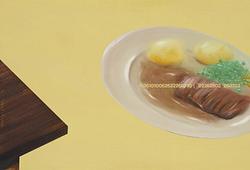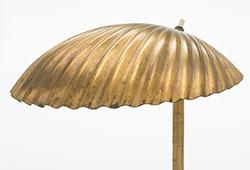Carl Larsson
"Syende flicka" / "Anna S."
Signerad C.L. inom en cirkel och daterad 1911. Akvarell 66 x 99 cm.
Proveniens
Ursprungligen i kammarherre Harald Bildts samlingar (förvärvad direkt av konstnären i juni 1912); privat samling.
Utställningar
"Internationale Aqvarellenausstellung", Düsseldorf, maj 1911; Liljevalchs Konsthall, Stockholm, "Carl Larsson. Minnesutställning", 6 mars - 5 april 1920, kat nr 276 (under titeln "Anna S."); Petit Palais. Musée des Beaux-Arts de la Ville de Paris, "Carl Larsson. L'imagier de la Suède", 7 mars - 7 juni 2014 (under titeln "Anna S [Jeune Fille cousant]").
Litteratur
Carl Larsson, "Andras barn", 1913, avbildad; 'Kammarherre Harald Bildts hem. Strandvägen 7 B, Stockholm', artikel i (red) Albin Roosval, "Svenska hem i ord och bilder", 1914, omnämnd samt avbildad i interiörfoto ("Hörn af salongen") sid 54; Ulwa Neergaard, "Carl Larsson. Signerat med pensel och penna", 1999, upptagen i katalogsupplementet under år 1911, sid 137 som nr 1442.
Övrig information
Den eleganta kompositionen fångar en stilla stund av handarbete i den s.k. Verkstaden på Lilla Hyttnäs i Sundborn. Rummet i fråga tjänade ursprungligen som ateljé innan den nya större (Sveriges största på sin tid) ateljén invigdes på nyårsafton 1899. I samband med detta flyttade Karin Larsson in med sina vävstolar i det gamla utrymmet som därefter kom att kallas Verkstaden. Rummet, vilket även fungerade som sällskapsrum för hela familjen, domineras än i dag av gul pärlspontpanel och gröna snickerier. Inredningen är både egensinnig och praktisk. I bortre hörnet återfinns till exempel ett podium, på vilket Karin inrättade en arbetsplats med en symaskin så att hon, genom de intilliggande fönstren, kunde hålla ett öga på lekande barn utomhus samtidigt som hon skapade sina textilier.
Den syende flickan är Anna Sjögren, bördig från Sundborn och syster till Hilma Kvarnberg som vid denna tid, tillsammans med sin make Erik, skötte Spadarvets lantbruk åt Carl Larsson. Enligt Carl Larssons levnadstecknare Ulwa Neergaard är det troligen Suzannes utstyrsel som håller på att märkas och fållas. Detta då Carl och Karin Larssons dotter Suzanne stod i begrepp att gifta sig med den unge läkaren Petrus Ranström. Om så är fallet var man ute i god tid. Bröllopet stod nämligen den 31 augusti 1911. Blomsterarrangemanget med pingstliljor och videkissar ger dock på handen att motivet utförts under våren, troligtvis i maj månad. Det var, med andra ord, ett rykande färskt konstverk som Carl Larsson sände till Düsseldorf där det ingick i hans kollektion på "Internationale Aqvarellenausstellung" i maj samma år.
Den eleganta akvarellen ingick ursprungligen i kammarherre Harald Bildts samlingar. Enligt noteringar i Carl Larssons bevarade kassabok förvärvade Bildt akvarellen i juni 1912 genom att returnera ett tidigare arbete av konstnären ("Sittande naken flicka", olja, 62 x 81 cm, 1906, Malmö Konstmuseum) vilket Bildt hade förvärvat fyra år tidigare. För att affären skulle gå "jämnt upp" fick Bildt även erlägga 800 kronor som mellanskillnad.
Akvarellen hängde därefter under en rad år i Bildts våning på Strandvägen 7B i Stockholm. Våningen var egenhändigt inredd av Bildt och i "Svenska hem i ord och bilder" skriver han: "Våningen synes mig nu så mycket en del af mig själv". Akvarellen var placerad i salongen vilken beskrevs av Bildt enligt följande: "Mellan skrifrummet och hallen ligger våningens vackraste och bäst genomtänkta rum, kabinettet eller salongen, en symfoni i grönt, grått och guld. Väggarnas matta guldfärg utgör en lugn och tacksam bakgrund för färgglada akvareller af Egron Lundgren, Georg von Rosen (ett förtjusande ungdomsverk från 1865, som oafbrutet varit i min släkt sedan dess), Carl Larsson och Oskar Bergman".
Konstnär
Carl Larsson räknas som en av de största svenska konstnärerna genom tiderna. Han föddes i Gamla Stan i Stockholm och studerade vid Kungliga Konstakademin åren 1866-76. Efter studierna i Stockholm reste han till Frankrike och bosatte sig i Grèz-sur-Loing, dit också andra konstnärer sökte sig. Där utförde han främst målningar med trädgårdsmotiv. I Frankrike träffade han sin blivande maka Karin Bergöö, som också var konstnär och kom att betyda mycket för hans produktion. Redan under studieåren försörjde han sig som fotoretuschör och som tecknare i pressen. Det var också under studietiden som Larsson lärde känna Anders Zorn och Bruno Liljefors, tillsammans brukar de tre kallas för ABC-konstnärerna. I slutet av 1880-talet fick paret Larsson ”Lilla Hyttnäs" i Sundborn utanför Falun av Karins far och det är där Larssons mest kända akvareller som skildrar hans familj kommer till. Motiven föreställer ofta soliga landskap med badande och metande barn, kräftfiske, måltider i det gröna samt interiörscener. Larsson är bland annat representerad i Nationalmuseum där väggmålningen ”Gustav Vasas intåg i Stockholm” och ”Midvinterblot” fyller trapphallen. Väl representerad främst på Nationalmuseum i Stockholm och på Göteborgs Konstmuseum.
Läs mer


















































